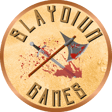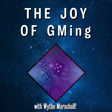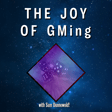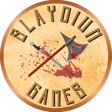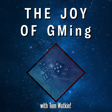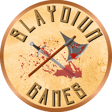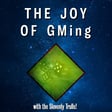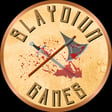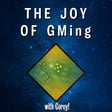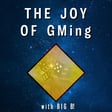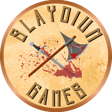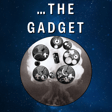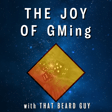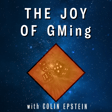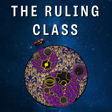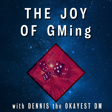Introduction to Joy of GMing
00:00:35
Speaker
Whether you're at a game table, in your comfiest chair reading a book, or listening at home, there's nothing like a great adventure story. But they don't happen by accident. Welcome to the joy of GMing, a special interview series on the craft of great gaming.
Show Format and Connection to Doctor Who
00:00:50
Speaker
There's just something magic about sitting down to a good table with great friends, isn't there?
00:00:55
Speaker
If you're a lifelong gamer or a newbie rolling up your first character sheet, if you're a DM or a GM or just can't get enough tabletop talk in your day, this is the show for you. Each episode will bring you amazing guest speakers to talk about writing games and running them
00:01:12
Speaker
building fantastic worlds and compelling story arcs, and oh so useful tricks of the trade. Hear some amazing stories, get inspired for your next game, and join us! This sister series to Anywhere But Now, our Doctor Who actual play podcast, will be released between mods or episodes with our ongoing serialized show. We'll cover some making of and behind the scenes tidbits of our latest mods as well, so do stick around.
Casey Jones' Media Experience
00:01:38
Speaker
I'm Casey Jones. Over the last dozen years, I've written and produced screenplays, children's animation for TV and film, graphic novels, stage plays, murder mysteries, and audio adventures. I've also been writing and running tabletop games for over 10 years.
00:01:54
Speaker
Join me as we dive deep into tabletop with experts in the field.
Justin Ren on Wraith and Kickstarter
00:01:59
Speaker
Experts like our special guest today, Justin Ren. Hello, Justin. It is a real pleasure to be on here because I'm actually a listener of your podcast. Oh, wonderful. Specifically, The Fixer is one of, before we get started, I have to tell you, The Fixer is such a cool character. It's cool to be on here because I'm a fan.
00:02:20
Speaker
I cannot tell you how much I appreciate that and a brand who plays the Fixer will also be super thrilled. Justin is a passionate and dedicated lead game designer at truly bizarre games known for his unwavering love for the gaming industry. This unyielding enthusiasm for game design and the players that enjoy them
00:02:41
Speaker
led him to pursue a career in the industry. He's about to launch Wraith, a sci-fi, fantasy, mech, tabletop RPG on Kickstarter. Justin, thank you so much for joining us today. It's my pleasure. I love talking about GMing and gaming in general, and this is definitely one of the cooler podcasts to do it on, so very happy to be here. So what can you tell our listeners about truly bizarre games, Justin?
Truly Bizarre Games' Origins and Philosophy
00:03:08
Speaker
So Truly Bizarre Games is a game company that basically me and my friends created about three years ago. We had decided that gaming has always been, especially for me, particular gaming, I've always had a really special relationship with gaming. Not so much in the playing of it, but as in making it. So every time I would play, we'd play a video game or we'd play a board game or even D&D, I would always try to find ways to adjust it or change it
00:03:38
Speaker
do something that made it different and eventually i remember asking my friends on discord one night i was like hey if you could play one game that doesn't exist right now what would it be um and they said that it would be a mech like a mech game that they could be the pilot and actually feel like the pilot because that's something that is sort of lacking in that genre and that's sort of where wraith and truly bizarre began
00:04:06
Speaker
That's really fascinating. Yeah, I love how creatives like yourself discover a niche that hasn't been filled yet and decide that's where I'm gonna start digging. That's where I'm gonna plant my flag, put out my shingle, mix a couple other metaphors together so it's completely garbled and start writing a game. How do you focus on making your mech pilot feel like they're there? How do you accomplish that?
00:04:35
Speaker
So it was making sure that they felt big, felt freeing. Like you could do things that you could do in a 30
Innovative Mechanics in Wraith
00:04:45
Speaker
-foot mech. And one thing we really wanted to first get away from specifically was classes like Barbarian or Warrior, Ranger.
00:04:57
Speaker
And also, repetition. So any time we refer in the game, in the book, anything I do with Wraith, we refer to the players as pilots. And it's a small thing, but it's a thing that does help. We just did a bunch of play tests at Gen Con, and when all the players sat down, it was the thing I said, welcome pilots. That does help. And then, of course, the systems in the game being kind of big and bombastic make you feel like you're in the mech.
00:05:27
Speaker
Oh, that's great. I especially like that little, that little attention to detail immediately addressing them as pilots. I'm sure that immediately gets them into headspace. So how did you meet friends that you started the business with? My partner, Mike Sexton, I have been friends with him since sixth grade.
00:05:46
Speaker
that's wonderful. Every idea we've ever had and it has evolved over the years and it's always been in the gaming industry be it like we wanted to originally make our own car shop because we both play Magic the Gathering and we both love tabletop gaming. It's just sort of evolved over the years to finally
00:06:03
Speaker
where I finally sat down and went, okay, these are my strengths, which is why I asked the question, if you could have a Getty game. I already knew what I was going to do. I just wanted to get in direction.
Team Dynamics and Collaboration
00:06:15
Speaker
And then I went to Mike, like I do with all my ideas. I went, hey, Mike, because he's super business oriented. He's super math and numbers guy. And I'm a creative. I like writing and
00:06:26
Speaker
Creating stories and mechanics and all of that stuff. So I went to my way. Hey, I have an idea stay with me and Told him about what I wanted to do with truly bizarre Sold him the overarching the big picture and then he did what he always does which is squish it down and go Okay, here's what we need to do to get where you want to go
00:06:46
Speaker
We have Tanner, our content manager. He's been my friend for many years now. Michael Patterson, our art director, also a friend on Discord. People I play D&D with. This is basically my D&D group that I just turned into my company. And then, of course, Lettie Sexton, my partner's wife. She is our social media director. And what's great is we didn't go, you have to do this and you have to do this. We all kind of fell into our strengths to start with. And it's worked really well so far.
00:07:14
Speaker
That's incredible. That's wonderful. I would love to take this opportunity to encourage our listeners, especially the GMs and the DMs that are thinking about producing your first game or starting your first podcast.
00:07:29
Speaker
ask for help, like lean into your strengths and get away from this headspace of I have to do all the things myself. I have come from the type A personality that has to control and do all the things, and that can be such a hindrance to actually getting the things done. Thank you, Justin. Thank you, yes, for reminding us.
00:07:53
Speaker
If I'm not mistaken, I want to say you were like big into theater and improv, right? So you've definitely dealt with that type before. Very much so. Well, that's the nice thing about a tabletop game. It lends itself to collaboration. It lends itself to riffing from one person to the next and extending the story and helping it grow.
00:08:16
Speaker
like with an improv scene, especially long form improv, once you have the premise, once the rules of magic or sci-fi A, being sci-fi A, have been established, then you're off to the races. You're just listening to the other players, the other people on stage, taking mental notes half the time, and making sure you can run with it, and sharing the stage, sharing the table.
00:08:41
Speaker
Oh, absolutely. And there's zero chance I could have done this by myself. The team that I have around me is perfect because I again, just like you said, I have my strength and I encourage everyone. It doesn't have to be a lone wolf. Do it. You do everything from the ground
World-Building in Wraith
00:08:58
Speaker
up. You don't have to. You have
00:08:59
Speaker
people in this in people your friends or just people in this uh the tabletop role-playing game community are wonderful i met so many of them at gen con this past weekend and i'm telling you they're out there and they're willing to help so tell us more about the the sci-fi fantasy mech game wraith that you've put together tell us about the world building like some of the features of piloting your own mech absolutely
00:09:25
Speaker
With Wraith being a sci-fi fantasy mech game, the reason it started there is I originally wasn't a big sci-fi fan. The only sci-fi-ish thing I ever really was into was Doctor Who and some Star Wars, but that's as much fantasy as it is sci-fi. With Wraith, I wanted to blend it to as close as I could, even though I wasn't a big sci-fi fan. I studied it and I did a ton of research to make sure that it felt
00:09:53
Speaker
true to the genre while also true to what I love, which is that high fantasy magic. So what I end up doing is Wraith is a solar system that our pilots will step into. When they make their characters, they're going to make their pilot, which is going to be one of the races I created for Wraith.
00:10:12
Speaker
Okay. And there's five of those, the Hireth, the Holduar, the Fyr, the Arminthians, and the Dright. And I know those just sound like words, but there are five very unique species of wraith, and they each have their own homeworld, though every homeworld in the solar system can be home to any of the species.
00:10:36
Speaker
It has its own history, its own lore. Every planet has its own ecosystem and its own things happening, which is really important that I wanted my players to know that if they want to, we have an un-wraith, there's an ice planet called Aldaria. And on there, the Dright live. The Dright are these really engineers to their core. They're engineers and craftsmen where
00:10:59
Speaker
somebody would see just a pile of cogs and switches put together they see it as an art as a painting is and on that ice planet they've created these enormous forged cities and these city-sized greenhouses where through engineering they've able to survive on this ice planet well that's very unique to that and then
00:11:21
Speaker
there's a planet called Avax where our Holduar or space elves where they live and Holduar is this big beautiful or Avax rather is this big beautiful forest planet that's a Pangea so the continents have never spread the Holduar invite all of the species to Avax because they're the oldest species to guide them in the use of Aura the magic in Wraith Aura is in everything it's in the plants it's in
00:11:49
Speaker
the very ground and our pilots can learn to manipulate our and move it and use it to cast spells, use it to heal men wounds in the heat of battle. And Avax is about learning how to use that. So it's very serene. The cities aren't even called cities. The whole war called them libraries. So I wanted to make sure it felt very unique. Each planet had its own identity. It took a long time to write, but it was very important to me that
00:12:16
Speaker
operation commander so our version of DMs are called operation commanders and if the operation commander took you on like a maybe a one-night mission to morn hollow the fears home world it felt so very unique and different than if you went to Ghola the moon where the high rether from if it should feel super different so that was important to catch not only the high fantasy aspect but the sci-fi aspect as well
00:12:45
Speaker
Yeah, it sounds like you've really put a lot of thought into the balance between those two contributing flavors. There's obviously a ton of overlap. Mm-hmm. But I would also love to paint an even more vivid picture. Like these mechs, are they as tall as a building? Are they as tall as a skyscraper? Oh, yeah, of course. Like where in the span of Godzilla to King Kong?
00:13:16
Speaker
so they're 30 feet so they're about as tall as your average telephone pole okay nice so they're not hulking kaiju busters okay but they are extraordinarily powerful 30 foot tall mechs that the pilots will go and face the thing that is invading wraith and
00:13:36
Speaker
the overarching story which is there's a void army called the veil the clips that has come back to wraith they attacked wraith thousands of years ago were beat back and they're back now which is where we actually did the demo is the demo of at gen con was the invasion of wraith so the veil the clips is a wide void army full of a bunch of different really nasty
00:14:00
Speaker
very evil creatures and monsters that will come in and attack the different planets. So yeah, and each mech has its own base. So there's the Might Base, which is a very up close and personal, close combat mech. There's the Reflex Base, which is more long range and agility.
00:14:20
Speaker
and then based on those bases you can choose and sort of start guiding which way you want to go with your pilot. Nice, so you can custom tailor the mechs and the pilot skills as you go along like any solid RPG you've got room to diversify and room to get better at things.
00:14:38
Speaker
Absolutely. There's 275 items. Most items have unique skills attached to them. That's how the skills of Wraithwork is based on the items you have equipped. They will give you unique skills and then also give you unique resistances.
00:14:55
Speaker
It's not always optimal to just pick one set of gear and then just do that the entire time where we found in demos that people will actually choose different bits of gear, hold on to it, and then change, which is what we're really hoping players will enjoy doing. Good.
00:15:13
Speaker
I can see how that would appeal, how they can collect their own sets of different pieces of kit they can put together and specialize. That sounds really cool. And before we get too far from it, I did want to say kudos on the name of the villain that's very menacing. That's nice and solid. The Veiled Eclipse. Yes, the Veiled Eclipse. That one took a while. I came up with some really bad ones until I landed on that, so thank you. I really appreciate it.
00:15:41
Speaker
That is a wonderful in to talking about that creativity though. Like I've been doing this for more than a minute and can confess that at a certain point like the ability to come up with a name or a title for something has become easier. Obviously with practice these things get easier. One of the tools I love breaking out is like just a sheet of scratch paper.
00:16:07
Speaker
and just, you know, putting words together that are like thematically appropriate or words I want to get a thesaurus together for so I can get synonyms for like dark and murky and failed and obscured and what else is dark and ominous and so forth and just play with those words and move through some true stinkers of ideas on the way to the good stuff. Like it is... Oh, absolutely.
00:16:34
Speaker
I will write out a list and just brainstorm reasons for a plot to move in a certain direction or for a character to be there or for a villain to take or not to take certain actions. And those first couple of ideas are like, and then, okay, that's, that's a little better, but why, why are there, oh, oh, there. Yeah, that'll work. And then we're off to the races.
Villains and Emotional Impact
00:17:01
Speaker
You always know when you hit it, there's this feeling in the back of your head when you're like, you say it. So when I finally hit fail the clips, it almost felt like a Lego clicking in the back of my head. I was like, that's it. That's the one right there. When I'm playing a D&D, a cult name, like in our D&D campaign we have now, there's a cult called the Shattered Hourglass that they're chasing. Another good name, Shattered Hourglass, very evocative. Yeah.
00:17:28
Speaker
I went through so many notebooks, but I used to carry notebooks around with me. Now I just carry my super note, which is an E8 tablet. Not sponsored, but certainly could be. I will just, when I think of something where I'm like, oh, that would be a really cool boss, or that would really be a cool world or name, I'll write what it does. Like, what is the boss do? What is their motivation? What is their, why do they,
00:17:54
Speaker
want to do what they want to do and then once I get the feeling of the enemy or the world or the name and then I'll start going okay what does what names pop up when I think of this concept and then that's how I'll start knocking it out that's beautiful that's absolutely beautiful and it can even extend to things like man versus nature
00:18:16
Speaker
because sometimes it is not a specific, terrible will behind the things that you're facing. Sometimes it's just a cataclysm. Sometimes it's a natural, or in sci-fi doctor who terms, a quantum disaster. And then we have to think about, well, how does that reflect our characters? How are they going to view this? How are they going to respond to it? And by starting to play
00:18:42
Speaker
with previous entries in the genre that we can get a feel for, like this evoked a certain emotion, this made me feel some trepidation and fear, and we can get closer and closer to the underlying imagery.
00:18:57
Speaker
the things that made it that gave us those feelings so that we can turn them and twist them and fray them apart until it's something new and nasty and motivated and it just creeps right out of the cracks yes perfectly said absolutely I'll try it when I'm trying to
00:19:19
Speaker
evoke a certain emotion like during the playtest demos that we did. The final boss that everyone fought this weekend at the end of the two-hour session was a boss called Nisroth.
00:19:32
Speaker
And Nisroth is this, it's called a Veiled Warden. Veiled Wardens are hard to look at there, almost eldritch in nature. So I wanted to make sure that the name felt hard to listen to. So anything with like a Z in the middle where it, and you focus on the season, like Nisroth, it almost is hard to say sweetly. And that was like perfect. And it worked. The every time Nisroth would
00:19:57
Speaker
introduce themselves and then like getting the voice though I don't tend to do many voices just cuz I'm not very good at it this one it was easy cuz it was just low and growly I'm Nisroth and the players faces lit up and I was like okay yeah that that's the emotion I was hoping for very nice
00:20:17
Speaker
very nice yeah no the see you're one of the only other writers or creatives i've encountered that takes the sound and the feel of specific consonants into consideration when you are coming up with names because i think that's very important that the way a thing sounds
00:20:36
Speaker
whether the roundness of its tones or the fricative nature of its consonants or the zzzz growling going on. I definitely think that's a factor and I love that that was actually part of figuring it out for you. That's lovely to see.
00:20:53
Speaker
It's something I sort of stole from Doctor Who, actually, because a lot of the bad guys, even though it's like the silence every time they talk, there was this wispy drawl to their voice.
00:21:09
Speaker
You should kill everyone on sight.
00:21:27
Speaker
Well, I can see it. I mean, this is not sadly a visual medium for our listeners, but talking with your hands, using them like a conductor before the orchestra. You know, this is quality GMing stuff. This is quality DMing. Tell us what a good demo feels like
Game Demos and Kickstarter Strategy
00:21:45
Speaker
to you. Like, you've got 10 minutes, 20 minutes to show off a game's strengths to new audiences. How are you going to break them in that way?
00:21:53
Speaker
So a good demo doesn't have to show all the systems of the game. Just has to show the core pillars. It's your elevator pitch to the masses. So what pillars do you want to show them for Wraith?
00:22:09
Speaker
in like, for example, the thing I really wanted to show everyone was our degrees of success system, which is our main dice rolling system. I also wanted to show them how combat works, how it's a bit, I've designed it to be a bit more frenetic than D&D and a couple other ones. So you want to show them, choose a couple pillars. You don't have like, I didn't do any of, there's a whole rune system that I didn't even put in the demo. I only had two hours, so I had to do like a session zero,
00:22:38
Speaker
I had to do character creation and then a start, middle and end. So I had to make sure the things that I was really, really proud of and in my opinion, the things that will hook people, all the extra stuff is just icing on the cake. The real good stuff is those pillars. That's what you want to do. So shave away the extra stuff, show the pillars, show the things that matter in your game and players will respond.
00:23:04
Speaker
Well put. So I understand that you have a Kickstarter going for Wraith. Can you tell our listeners more about that? Yeah, we decided to hold off on it. And the reason is we learned a lot at Gen Con and we got to talk to a lot of people who have been in the industry for a very, very long time. And with us just getting in with Wraith, we wanted to make sure that when we finally do launch the Kickstarter, not only is it going to be good for us, so it'll actually get funded. But I wanted to make sure that Wraith and
00:23:32
Speaker
what our backers are gonna get is worth backing. It's not just another, hey I have an idea, and then quickly throw it together and put it out. No, I want to make sure that the book they're getting is well written, well edited, the art is indicative of what Wraith is, so you get a sense of Wraith just by thumbing through before you even read a word. I need the book to feel that way, so when you finally do dive into the
00:23:58
Speaker
the meat and potatoes of the game, you already feel like a pilot, you already feel like you're in Wraith. We weren't quite there yet. The mechanics of the game work, there are no big changes there, and the game itself is done. But it still needs a bit more work. I saw that at GenCon, and I'm really happy to postpone it. But hopefully in a couple months, of course, keeping up with us on our social media, we're being super transparent about it, because we want to make sure when you all get Wraith, when everyone does get Wraith, it is the
00:24:26
Speaker
best thing that they can get their hands on.
00:24:29
Speaker
That is wonderful to hear. I'm sure there are other creators in our audience who might get caught up on just the frustration of what we were getting ready to launch and now we're not launching yet and see that strictly as a bad thing or a negative thing. I want to stress that I could not disagree more. As a writer, as a creator, things go through drafts.
00:24:58
Speaker
things with moving parts like games and programs. You kick the tires, you check the code, you make sure it works so that you can find those bugs and those things that could become features. But I have recently been going through something similar, putting together the first mods as playable at home with introductions and the classic format
00:25:26
Speaker
yeah i'm looking forward to that you know with like the the text boxes that have a little bit of extra information here and the easy to reference character sheets that are over here and i thought i was pretty hot shit i was like this is easy i know what i'm doing i'm a writer i've played games i can do this
00:25:45
Speaker
every time every time writing the actual text was not the issue what has been what has been throwing me for a loop has been the formatting because putting together a pdf that looks attractive and fun to flip through and like okay i can sink my teeth into this right away that is apparently beyond my abilities a present because one of the things that we want to focus on because it is a game and games should be fun games need to be accessible
00:26:15
Speaker
Absolutely. Which means the game has to be scannable, the language has to jump off the page and be accessible by e-readers and things like that, and so we have some more work to do. But rather than get frustrated and fold my arms and grumble about like, I'm a freaking thing I got to do!
00:26:37
Speaker
It's progress. It's progress in the right direction of like, oh, okay, there are people that do know what they're doing with this aspect of the formatting and the actual production of the PDF. And wouldn't you believe it, people on the Bluebird of Doom responded because someone asked last week of like, how do you prioritize accessibility with your PDFs of your games? And it's like, I actually don't yet. That is a place where I am falling short.
00:27:04
Speaker
and I'm recognizing this now and trying to do better and rather than point and laugh like you foolish fool, what are you doing? I was encouraged, I was given advice, I was told we'll reach out to so-and-so because they do this work great. No one is waiting to point and snicker at the little imperfections, okay? We are trying to do something and the fact, and I can hear it in your voice, that you want it to be as good as it can be. Absolutely.
00:27:32
Speaker
That is one of the most important ingredients, I feel. The passion for excellence. Because, like, having taste is great.
Feedback and Game Design Excellence
00:27:41
Speaker
Knowing what you like in a game is great, but if you're going to create content, be it a game system from complete scratch or a storyline from a game and a franchise that people may be familiar with, wanting to do it as well as you can and actually putting the work into doing it as well as you can,
00:28:03
Speaker
Also means when you get feedback from people, you incorporate that feedback, even if it doesn't necessarily feel, you know, 100%. Yes. Especially when it's something you've created or written, and I know you've written a lot. When you show somebody this,
00:28:37
Speaker
Mm-hmm. It'll never always just be up. No, you're fine. Go ahead and give me all the feedback. It won't affect me There will be a moment where you're like, ah, but I really like that mechanic But if it doesn't work, it doesn't work or I really like that part of the story, but it actually is
00:28:52
Speaker
the feedback's right and it kind of slows the scene down or it makes the character go invisible, which you don't want. The other thing that I would say to anyone listening is there's a phrase in gaming that I've heard so much and it's, don't let perfect be the enemy of good. Now, that is true. You shouldn't.
00:29:14
Speaker
don't sell your dream short just because you need you think you have to get something out there a little patience will make whatever you're working on closer to what you were actually aiming at exactly exactly plus
00:29:29
Speaker
This is the information age. We are more digital than ever. You can always update the game and release it again. We're learning to walk before we attempt to fly. We recently started posting videos on YouTube of our podcast with just the title card.
00:29:47
Speaker
But we're going to get better. We're going to figure out extra features. We're going to be able to make adjustments in the future and make things more compelling. Because we do want to engage with our players, with our audience. Being willing to take it into beta. To show up to Gen Con and to demo the game.
00:30:08
Speaker
And being willing to say, okay, we're not going back to the drawing board, but we are going to take it back into scrutiny and adjust some things is incredibly important. A good trick? It's impossible to be any kind of a creative without some amount of ego. One needs to be confident in oneself.
00:30:26
Speaker
if one is going to share one's work. The trick, when it comes to feedback, is being able to filter the fact that this is not about you, this is about making the work that is important to you as good as it can be. That mental process does get easier. And the fact that someone is trying to help you make this thing that you are putting so much energy and effort into that much better can hopefully motivate you, even if it takes some time.
00:30:56
Speaker
Oh, absolutely. That will come and the more you do it, the more you realize, oh, this is getting better. And then you start getting those little rewards, which is like hearing people have fun with your game. Gen Con was the, this last week it was the ultimate reward for me because it was the first time that I've done all, so we did seven two hour play tests in the first exposure room.
00:31:18
Speaker
And it was so nice to see people living in that world and nothing hindering them mechanic wise. And they were just, they were in Wraith, they were playing as the pilots and they were using the vernacular, which is really cool as a writer, to hear people use the things that you wrote three years ago, use the words like Hyreth or Holdwar, Avax or Eldaria. And you're like, oh, that's so cool to hear them actually talk about it. That's a thing of beauty.
00:31:47
Speaker
What drew you to game design in the first place?
Justin's Transition to Game Design
00:31:51
Speaker
I've always been a writer and I've always been very creative. And when it came to games, when I played Magic the Gathering or when I played board games or even some video games, I would always found it wasn't so much just the act of play that I was focused on, but I would always focus on the crunchy bits, the mechanics.
00:32:14
Speaker
how those mechanics helped tell a story. I remember when I first started DMing and that's really I think the onboarding to any design spacer rider when you start actually DMing and telling stories. I would start writing stories and then eventually I would start making boss mechanics that weren't maybe in D&D officially and I would change a mechanic up. Or one of my friends would go, hey, I really wanna do this with this barbarian.
00:32:41
Speaker
but it's not technically in the game and then we sit down and rewrite the mechanics and eventually the D&D that we were playing at the table barely looked like the actual game at least especially with my monsters and my monsters and my dungeons I almost never actually used like Faerun or the actual book
00:33:02
Speaker
I would use the book to let them make characters and let them have those mechanics because it was just easier. But anything I did on that, like this side of the DM screen, I basically created. So then when I finally was like, man, I really want to, I mentioned was like, I could make a game. So I ended up making, asking them about Wraith. Funny enough, I ended up like creating a one character sheet each. I like pre-made character sheets.
00:33:29
Speaker
one page of text for like my proof of concept of wraith i had all my friends basically all truly bizarre come over around the table i gave them all dice i was like all right here's your d6 here's your d6 we miss on one to three we hit on four to six all right go and i dm'd a small probably about 45 minute campaign on what is now aldaria it was the first time i had seen people play a game i had made
00:33:56
Speaker
and I was immediately hooked. The feeling of watching somebody, and I've made board games now that we've tested, I've made card games. And we have several games, and as soon as Wraith is done, we're going to be able to move up very quickly. It's who I am. I love making games, because I love knowing that eventually these are going to get in the hands of players.
00:34:16
Speaker
and i'm gonna give them like two or three hours of just fantasy escape and i i think that's really exciting so i got hooked immediately and it's all i want to do now
00:34:27
Speaker
absolutely there is something fun about creating your own monster for the heroes to face especially if you're the one dictating where and possibly when they meet those baddies like i would love to hear about a biome specific monster
00:34:49
Speaker
that you've come up with for Wraith and how it felt the first time one of your test players came up against one of those. Can you tell our listeners about that?
00:34:59
Speaker
Yes, we had a, in the test, they go into this greenhouse. I wanted to elicit something that when you think greenhouse, you think crops, you think sun, heat, but also humidity and that fog and mist and smoke. If you've ever been in a greenhouse, especially early in the morning or late at night, you know that the greenhouse, like the glass will fog up and there'll be like some rolling fog on the ground.
00:35:28
Speaker
So I created these monsters that when my players first meet them, they're just little purple and black wisps of smoke. That if they don't look down, they don't see right away. And if they keep walking, the wisp will follow them. But if they do look, depending on how they interact with them, they'll interact differently eventually. They will form into these giant circular portals behind my players.
00:35:55
Speaker
and then create portals, and out of the portals comes the first, a veiled thrall. The veiled thrall is this 20-foot being that has two chains wrapped around its hands. It's that purple and black smoke just roiling over its skin, and it has a featureless face, and when all four come out of these mist portals, they all open their eyes, one giant eye in the center of the face, and then they attack.
00:36:21
Speaker
and that moment is cool because most of the time there's one group where it caught them off guard but most of the time they sit there and spend like 10 minutes playing with the mist trying to figure out what it does trying to talk to it
00:36:36
Speaker
That's wonderful. You a Charles Dickens fan by any chance? I am, yes. Because I'm hearing all this talk of wraiths and specters and ghosts, and I hear the jangling chains in my head, and I'm immediately just thinking of A Christmas Carol. You are the first person to make that connection. I've talked to a lot of game designers. A lot of people have played Wraith now. A lot of people have played that particular event. And yes, I'm heavily influenced by Charles Dickens. Beautiful. Beautiful.
00:37:06
Speaker
monster design taking something you've got the system that you're building and your players have played games before so they're going to be familiar with the bones the mechanics of okay this is how it's how strong it's gonna be how insidious how scary etc
00:37:23
Speaker
Playing with classic Whovian Doctor Who monsters, or New Who monsters for that matter, and twisting them, tweaking them that little bit so that there's something thematically a little different. To give an example of the Boneless, one of the Capaldi era monsters, started off as graffiti monsters. They were flattening people in their outlines against the walls.
00:37:48
Speaker
And that worked, especially for the cast that they had and the part of London where they were cleaning up the projects with community service and everything. But I also love, like, Victorian who, Edwardian who, turn of the century stuff, carts and wagons on the streets, horses clop and buy, no or very few electronics to speak of. With the Mirim, the monsters that we
00:38:17
Speaker
spun together were determined to be cousins of the boneless with similar properties and similar powers, but under completely different environments. So instead of, you know, creeping up the walls of the apartment or down the tunnel under the estate building, you've got them pooling in shadows, waiting behind mirrors inside of vanity glass.
00:38:42
Speaker
or scaring the daylights out of poor Mrs. Darling running that tea shop, you know, getting to see and hear the players' reactions. This is one of the reasons I love working with Kate and Brand and Dora.
00:38:57
Speaker
but they give great reaction face to things especially if it's on the spooky side and oh god they're they're a joy they're an absolute joy to play with this motivation you talked about this desire to just help people escape for an hour and a half is one of the key
00:39:21
Speaker
drives I have for the stories and for game writing in general. Reality is tough enough.
Role of Tabletop Games in Mental Health
00:39:30
Speaker
Let's spend at least a little time on something where we have the illusion of control. Absolutely. Even if it doesn't occupy space bigger than this tabletop.
00:39:43
Speaker
I'm very, very passionate about A, giving people a chance to get away from whatever they're dealing with, but also like mental health and making people feel seen. And I think that's gaming, especially TTE RPGs are such an amazing way to do that. Yeah, I absolutely agree. It's such a wonderful medium. And I think it's why I went into design because it helps, it lets me help people in a way that I'm best suited to, which is games. It's who I am.
00:40:11
Speaker
That's wonderful. That's fantastic. Do you have any game design tips for our listeners? Imagine you're at a table at a coffee shop and there's someone across from you who is putting together their first game. You've got maybe five minutes with them. What are the most important tips you would give to someone building their first world?
00:40:35
Speaker
So building your first world, find elements that you already naturally love. So if you are a big sci-fi fan, focus on bits of why do you like sci-fi so much? What are some of the pillars of sci-fi you love for fantasy? Focus on that. What are some of the fantasy pillars you love? And then write those first.
00:41:00
Speaker
what kind of magic you don't even have to come up with the rules right away so what kind of magic like for wraith it was ara it was a it was a force that is only in the solar system of wraith and it's in the plants it's in the actual earth also species wise i am an elf player i always have been i know a lot of people don't like them it's just i love elves so i knew as soon as i was gonna make wraith it was gonna be a sci-fi game that i was gonna figure a way to put elves in
00:41:27
Speaker
Listen, I like two things. I like elves and I like giant mechs. And as God as my witness, I will put elves in that giant mech. That was the monologue in my head while I was sitting there writing it. When you have the bones of your world, don't worry so much about the rest of it right away. Get the bones of it, start writing little stories, and you don't even have to name the person
00:41:51
Speaker
Stickman A is going to this town and based on what you wrote what happens? Then you'll notice as you're writing you'll go oh yeah this is a thing and then this is a thing and then you just keep pulling out of nowhere different layers and then eventually you'll look and you've built an entire town. How does it run? Is there a government? What's around the town? What sort of problems do they face?
00:42:17
Speaker
are there creatures in the town and how would your stick person help with their problems and then all of a sudden you have rules and you have adventure and you actually will start building your world and then you can build mechanics around that. That's the game designer part is I always build environment and then I build mechanics that suit the environment. Smart. I know some people will swear by make a game around your mechanics
00:42:42
Speaker
can't do that. I build the story. I'm a writer. I write the story first and then I will make mechanics that make sense in the story.
00:42:52
Speaker
That's very smart. I think you hit on something very useful, which was to start with what you love, start with what drew you to the genre in the first place. And I can think of examples where I leaned very similarly into that. While we're talking about greenhouses and world building,
00:43:15
Speaker
One of the first mods I wrote for this specific team of players was our second one out of the gate, Troubled Waters, where they go to a water planet, an aquarium world. I love the aquarium. The Baltimore Aquarium, one of the best sources of joy I've ever personally visited. I have very
00:43:35
Speaker
fond memories as a child and as an adolescent and even as a grown-up. Visiting the Baltimore Aquarium, I love it there and started with those memories. Well, what did I like while I was there? What stuck out for me?
00:43:50
Speaker
and visiting the greenhouse where all the most exotic animals are being kept. And they had a little dome where they had different jellyfish swimming safely together or apart from each other. Everything was controlled, everything was very deliberate. Starting with those ingredients of like, okay, so we've got to be climate controlled, we've got all these different habitats right on top of each other.
00:44:13
Speaker
How is that going to play? Are people going to be butting heads? Are we going to have difficulties between different egos? Like, well, this is about science. No, it's about profit. No, it's about hailing down the Sontarans from on high.
00:44:29
Speaker
And then, making sure there's a gift shop, making sure we've got tour guides, who turns out to be one of the most important NPCs of the day. And we've got characters to root for, and relationships that aren't even on the planet, but somehow make those characters that much more sympathetic and important. Like when the greenhouse Dr. Lomo just mentions that she's pregnant, and that her spouse, her husband, and her wife are both rooting for different kinds of a kid.
00:44:58
Speaker
and they still have to deal with the shapeshifting jellyfish and the oncoming apocalypse if they get a full house over at the Arena Borealis, you know, and just circling back around to the naming of things like, I can't think of water without thinking about the cold.
00:45:20
Speaker
and the aurora borealis, the shifting dancing lights that we get in Alaska and the Great North and the Arctic, I wanted to see if we could turn that into an attraction for a park. And by taking what is familiar
00:45:37
Speaker
and what is sci-fi and mixing them together and packaging it. We come up with the Arena Borealis, which has the same rolling off the tongue, and it sounds familiar, and then you're like, wait a minute, hang on, Arena? It spells everything you need to know about the stadium-sized wonder show that that thing is. And it all takes place in one place.
00:46:00
Speaker
and the location, and what it's close to, and what you can find there, and the creatures you find in it, and the people looking after those creatures, and the egos that those owners of those people are dealing with. You hit the nail on the head, and that's actually something I wanted to compliment you on. I know this is Joia GMing, so I wanted to focus on that for a minute. Thank you. One of the reasons I love Doctor Who is their ability to blend the fantastical with things that actually are in the world that we experience every day.
00:46:30
Speaker
and you actually do a really good job at doing just that and it's not easy because I know because I do it as well yeah you do a really really really good job of that I appreciate that I appreciate that a lot like one of my favorite aspects of sci-fi is when it is not necessarily taken for granted but it is just part of the scenery it's like yeah that ship's a piece of junk and it's the coolest thing we've ever seen you know so like yeah ships are coming out of the sky we apologize for the traffic
00:46:59
Speaker
Making it commonplace, turning the astronomical into the commonplace, inhabiting it with characters that are a mix of both, I think, really is part of the Doctor Who sauce. Oh, absolutely. It's the full flavor, for sure. Are there questions you have for me? Are there things that you want to talk about in terms of GMing, in terms of running a game that you turn into a show?
00:47:24
Speaker
The one question that kept coming back to me, because we had this happen in the first playtest, the second playtest actually I ever did with Wraith, I had my truly bizarre crew.
00:47:34
Speaker
actually play the game. They destroyed, so I had this dungeon planned out for them to take their mechs up to and they had to go up into the sky and find a way to get up there. It was this big floating cathedral that loomed over the city and it had just appeared and everyone in the city was understandably freaking out about it and the pilots have come and through the story they actually go and they found a way to blow it up.
00:48:04
Speaker
and take it out of the sky. And have you ever, while you're DMing, had your players completely demolish one of your encounters in a way that you weren't expecting? Yeah, pretty much. I've gotten into the practice at this point of leaving a little wiggle room. Step one, write out what would happen if the good guys do nothing or put their attention someplace other than what the bad guy is doing.
Player Influence and Engagement
00:48:32
Speaker
Beyond that, I also have to think at this point about these specific players and their inclinations. Calamity, for example, played by the wonderful Dora Beatrix, sets things on fire and threatens to set things on fire. She is great brandishing a luau torch.
00:48:53
Speaker
So I have to think about, a little bit at least, like what happens if they get a try blah? What happens if they reach for so-and-so? So long as the action starts small and continues to mount and there are ongoing rising stages of stakes, wherever the good guys stop you becomes the climax.
00:49:13
Speaker
absolutely and then you can build around that of like oh my this is exactly what we planned the entire time oh because in reality you may have had an additional two three whatever stages that things could get to
00:49:29
Speaker
when the good guys start interacting, when they start making choices you never would have anticipated and roll with it. And if you can leave yourself room for them to turn off the doomsday beam before it really gets going, that's just part of the plan. I was like, of course you blew up my giant thing in the sky, you fool. It was filled with nanite grenades that will now rain down from on high.
00:49:57
Speaker
We have a mod called Lantern in the Smoke. Gaseous bad guys, the Gelf, are one of the primary antagonists in this. They haven't been used on the show outside of The Unquiet Dead, a absolute corker from the first season under Russell T. Davies. Mark Gaddis wrote Unquiet Dead. Gaseous aliens, spooky as hell.
00:50:22
Speaker
There are other baddies on the space station that have some really unhelpful powers in their set. And depending on when the heroes stop them, they either are dealing with a ship-wide emergency, or they're dealing with an emergency that literally is the whole ship. Our heroes have stopped things just before one of the monsters
00:50:51
Speaker
literally takes over and possesses the entire station akin to House taking over the TARDIS in The Doctor's Wife, wonderful episode Neil Gaiman wrote. And by building it out so that the choices they make that may upset things, that may knock over the tower before it's fully operational, can feel like it's still part of the story and that the players and more importantly their characters are the ones making it happen.
00:51:20
Speaker
That, I think, is the biggest, most important thing to convince to sell the story of, oh yeah, this was the way it was supposed to go. By sticking to what they're telling you they're going to do. Like, yeah, no, we blow up the ship. We blow it up. What's next?
00:51:35
Speaker
It's one thing I tell any new DM, don't be afraid to give your players the keys. Let them drive and just, sure, write some backups. My partner Mike, he was one of the people playing in that particular campaign and he has a tendency to blow things up and to destroy things. He's the one who always plays the barbarian. He always plays the warrior and his default is to run straight ahead yelling. The Leroy Jenkins. Absolutely.
00:52:02
Speaker
have some backups but also use that because your players don't know that you didn't have anything for that use that to flex your creative muscles even if it is just the thing falls from the sky explodes and you all level up because you beat the big bad don't go up I was supposed to do that we were supposed to do that the entire time
00:52:23
Speaker
Use it to flex your creative muscles a little bit because that's the only way they're going to get stronger and test yourself and let your players have fun. That was the story of Jed God. Nizroth, our big bad, that poor void demon, he went through it this weekend. We actually have a list. We have a list of how he was defeated.
00:52:43
Speaker
With Wraith we have a degrees of success system and that allows you to do a lot of really cool things so you don't have to stick to just basic attacks or your
Wraith's Degrees of Success System
00:52:52
Speaker
skills. One person got really into it and grabbed the roof of a house and threw it at Nizroth. One person suplexed him, one person held his wings and held him to the ground. They all asked if they could attack at the same time and do a multi-attack. One person, Nizroth, the Veiled Wardens,
00:53:10
Speaker
have chains wrapped around their entire body and they shift and move. He had chains that went out of his body. One of our players went, can I grab a handful of chains and just pin them down? I was like, all right, we'll roll to the degrees of success and absolutely. So yes, or and then my favorite one, which is they grabbed the two chains.
00:53:30
Speaker
Yanked them forward and then kicked them right between the legs I had not intended to voice act Nisroff getting hit there But I had to because what's even more fun than doing it is actually showing that it happened Give your players the key and have fun with it They're not always going to they're almost never gonna go exactly where you want them to and I think that's the beauty of TTRPGs
00:53:55
Speaker
I now have the image in my head of mechs made of various materials kicking a mech sized villain directly in the crotch. That is an image I will cherish for some time and it would not have happened without you. It is my pleasure. That's fantastic. There might be something to the Top Gun-esque testosterone driven mech piloting.
00:54:23
Speaker
it definitely it showed again this was last round the playtest at gencon we rented out a store and we actually had playtest there as well before gencon like we would have um really really shy and meek people would come up to the table sit down
00:54:39
Speaker
I'd give my ramble, I'd get them started, and then once combat started, and once they were in the mech and they're moving, and they're like, oh, we run, and I start describing how you're running through the greenhouse, and the only sound is the sound of your mech's feet just doo, doo, doo, and thus pluming up around you all as you break toward this relay tower. You would notice those people who were shy at first really start to come out of their shell and start to feel like they were in the mech. Is there any way to shyly pilot a mech?
00:55:10
Speaker
No, there's not. And I think that's awesome. This really quiet, this really quiet guy who was playtesting with us, he was very timid. He didn't want to join in much of the group at first. So I had to kept pausing and go, okay, what do you do? What do you think? Just to make sure he felt included.
00:55:29
Speaker
but by the end people he had never met before he was like all right i'm gonna throw this enemy at this enemy and at the same time uh and there's a move that uh has golden aura chains it's called pinning strike and if this if the creature you pinning strike doesn't move by the beginning of your next turn the pinning strike explodes and deals a bunch of damage
00:55:50
Speaker
and the person that went before him was the gentleman who was kind of shy, but by this time he's like, what if I throw this enemy with Pint that has the chains at that enemy and then end my turn and then he rolls and he starts his turn and then I went, roll two degrees of success both of you and they do it, they succeed and he goes, I pull and he actually acts out backing his mech up really quick because I grab the enemy and I throw him at the other enemy and I end my turn and he yelled it.
00:56:20
Speaker
in the playtest room and then the the one going next goes I start my turn and rolls to hit for the pinning strike and hits and a big explosion happened and the table cheers and that was a really cool moment yes so that's been one thing is it's arteries of success system has created these really really awesome moments and I'm I'm overjoyed by it
00:56:43
Speaker
It shows. It shows and it resounds. It resonates in your voice. I would call that an unqualified success test, though. Like, if you can bring someone so far out of their shell from beginning to mech piloting, throwing, and shouting across the table, I would call that a successful test.
Connecting with Truly Bizarre Games
00:57:03
Speaker
I agree, and I think all of our Gen Con was an extraordinary success. It far outweighed anything I could have imagined, so. I'm so glad to hear that. So, Justin, how can our listeners get in touch with you? So you can find us at trulybizarregames.com.
00:57:22
Speaker
you can go to twitter x whatever it's called it's twitter and we're at truly bizarre gmz and then of course on instagram truly bizarre gmz as well and then of course you can always follow me on twitter and justin rinn justin w r y and then wonderful
00:57:39
Speaker
And rest assured, all of those links will be visible in the doobly-doo. And finally, to our listeners, another great big thank you for sharing your precious time with us. If you feel it's been well spent, please share the joy of GMing with your friends who are looking to enjoy themselves. You can email your questions for me and our future guests and send that lovely fan art to anywhere but now podcast at gmail.com.
00:58:07
Speaker
And if you'd like me to run a game of Doctor Who or possibly something else for you, reach out on startplaying.games. If you like what you hear, leave a review, rate the show, and follow us on Blue Sky, Twitter, and YouTube at anywhere but now and wherever you get your podcasts. Links to everything in the doobly-doo. Justin, I want to thank you again so much for sharing your time. It has been a genuine treat talking with you today.
00:58:33
Speaker
Absolutely, it was my pleasure. I had so much fun. From all of us, I'm Casey Jones. There's exciting things to come, my friends. I'm glad you're along for the ride. Thanks so much, and have a great day.

